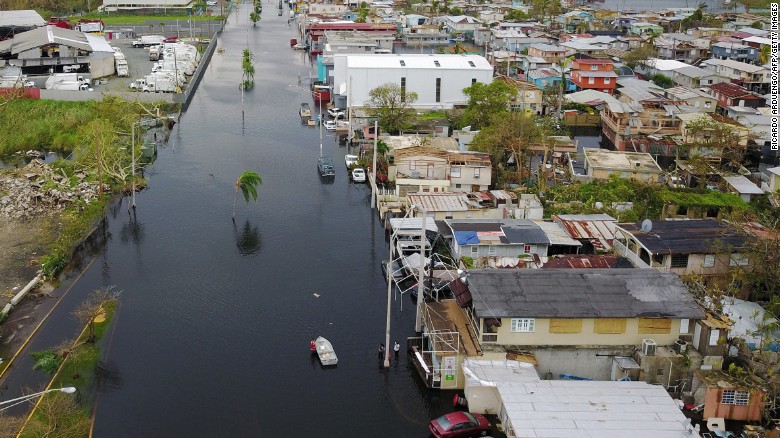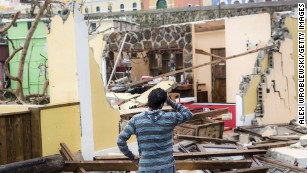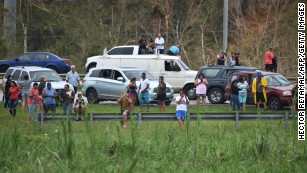'Apocalyptic' devastation in Puerto Rico, and little help in sight
(CNN)Hurricane Maria whipped Puerto Rico with Irma-level winds, drenched the island with Harvey-level flooding, crippled communications, decimated buildings and damaged a dam that puts downstream residents at risk of catastrophe.
But help has been slow to come to communities where the devastation is described as "apocalyptic," officials and residents argue.
Gov. Ricardo Rosselló said the nation faces a humanitarian crisis. He urged Congress to approve a commensurate aid package as the US commonwealth, already hammered by a prolonged economic crisis, tries to get back on its feet.
The governor joined others in emphasizing that Puerto Rico's residents are American citizens.
"We need something tangible, a bill that actually answers to our need right now," he said. "Otherwise, there will be ... a massive exodus to the (mainland) United States."
Leading Democrats called for swift action to help the island.
Hillary Clinton urged the Defense Department to send a Navy medical ship, while Democratic House Minority Leader Nancy Pelosi called for Republicans to join with Democrats to pass a robust relief package.
Hurricane Maria: Puerto Rico officials describe 'apocalyptic' conditions
"The Trump Administration must act immediately to make available additional Department of Defense resources for search-and-rescue operations, law enforcement and transportation needs," Pelosi said in a statement. "Our fellow Americans in Puerto Rico and the Virgin Islands deserve to know that their government will be there for them, without question or hesitation."
White House: Response 'anything but slow'
President Donald Trump has pledged federal help for Puerto Rico and the US Virgin Islands. A White House official said Trump is planning to visit Puerto Rico, but a date has not been set because of infrastructure concerns on the island.
Homeland Security Adviser Tom Bossert and FEMA administrator Brock Long were traveling to Puerto Rico, according to White House press secretary Sarah Sanders.
"The federal response has been anything but slow," Sanders said. "There's been an unprecedented push through of billions of dollars in federal assistance."
Airplanes and ships loaded with meals, water and generators have been arriving or are headed to Puerto Rico and other affected Caribbean islands, the Federal Emergency Management Agency said in a statement. More than 10,000 federal employeees are in Puerto Rico and the US Virgin islands helping with research and rescue efforts and moving goods, FEMA tweeted.
The Guajataca Dam
Puerto Rico faces a more immediate danger.
The Guajataca Dam in the island's northwest corner is releasing water after suffering a "critical infrastructure failure" following the Category 5 storm.
"Some of the dam has fallen apart," Rosselló said. "Now we are making sure that we can assess if the other part will fall down as well. It represents a great danger for about an estimated 70,000 people."
Residents below the dam were told to evacuate on Friday, according to the National Guard. With more than 95% of wireless cell sites out of service, authorities had to physically go to thousands of homes to warn people of the potential collapse.
Federal response to Hurricane Maria slowly takes shape
Rosselló said that while most people in the vicinity had evacuated, efforts were still underway to get people out in peripheral areas.
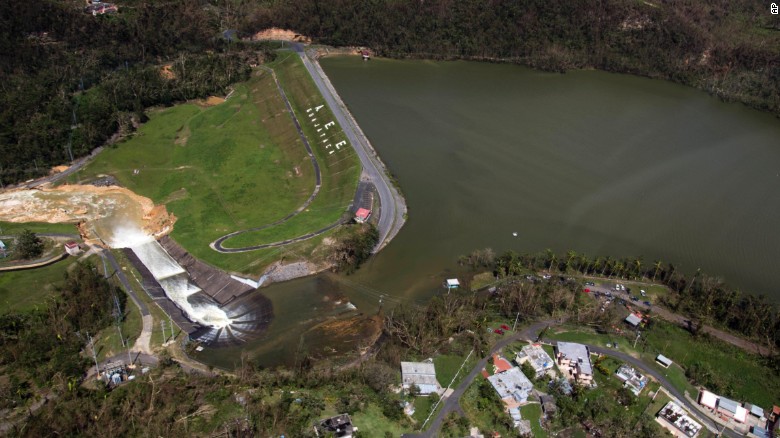
The Guajataca Dam suffered "infrastructure" damage following Hurricane Maria.
Communications cut
Without power and communications in much of the island, millions of people have been cut off from the world since Maria hit Wednesday.
"It is as if Puerto Rico got hit with the strength of Irma's winds, leaving a trail of devastation worse than much of the destruction Irma left in Florida," said CNN meteorologist Judson Jones.
"The rainfall in some areas of Puerto Rico rival the amounts of rain left by Harvey in Houston. And now they are contending with a dam disaster that is reminiscent of California's Oroville Dam crisis earlier this year."
After flying over Puerto Rico on Sunday, CNN's Leyla Santiago said residents could be seen along the highways searching for a cellphone signal.
"The island from above is a completely different color" due to the lack of trees, Santiago said, while pools are filled with black water and debris. The storm ripped the roofs of houses, exposing their interiors to the sky, she said.
Authorities who flew over the island Saturday were also stunned by what they saw. Roads are completely washed away and others are blocked by debris, isolating residents.
"It was devastating to see all that kind of debris in all areas, in all towns of the island," Jenniffer González, the island's nonvoting representative in Congress, told CNN.
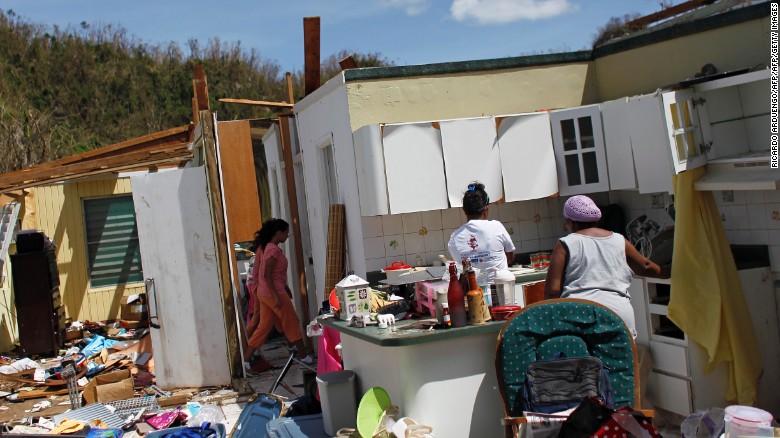
Hurricane Maria ripped roofs off many houses.
Hospitals crippled
At least 10 people have been confirmed killed by the hurricane.
A doctor at Canovanas Medical Center -- one of the few hospitals with a working generator -- said they were running out of fuel to keep it going. Dr. Norbert Seda told CNN that the center only had 2-3 days left of medical supplies and medicine.
News Courtesy: www.cnn.com

